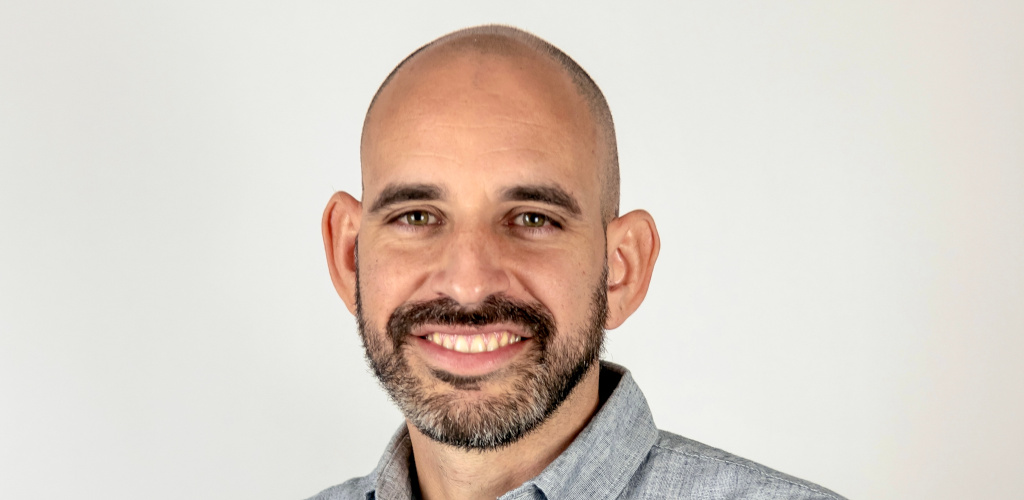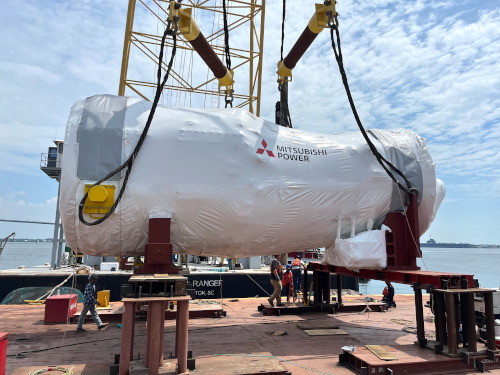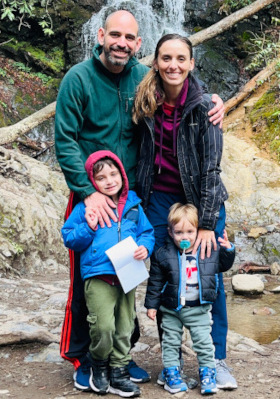Ditch the Sales Pitch, Shipper Urges Would-be Logistics Partners

By Luke King
For Issue 4, 2024 of Breakbulk Magazine, we sit down with Agustin Harriague, VP Logistics at Mitsubishi Power Americas, to find out more about his career in project cargo shipping, his personal philosophy and how to win logistics contracts from large industrial clients.
(7-minute read)
"People told me I was crazy,” says Agustin Harriague, recalling how in 2015 he gave up a secure job in logistics management in order to go backpacking around the world with his future wife. “In the end, it was the best decision I ever made.”
Harriague’s spontaneous sabbatical certainly doesn’t appear to have hindered his career progression. Now vice president, logistics at Mitsubishi Power Americas, the 40-year-old oversees a team of logistics specialists at the power solutions arm of Japan’s Mitsubishi Heavy Industries.
Charged with ensuring the safe and efficient transportation of complex project cargo shipments around the world, a “typical day is a difficult day,” says Florida-based Harriague. His remit includes managing the logistics operation for Savannah Machinery Works, the gas turbine manufacturing base of Mitsubishi Heavy Industries in the U.S., as well as external oversized equipment purchased by Mitsubishi.
“Project cargo drives a significant part of our spend; I would say around 60% of our overall spend is project logistics,” he says. “We have turbines up to 300 or 400 metric tons, generators that are over 560 metric tons.
“Gas turbines for the most part are shipped out of our factory in Savannah by rail or barge. We move them within the U.S., and to other countries in Latin America. We have been very active in Mexico just recently, as well as Brazil. My team will manage all those moves, globally, for projects that are booked by Mitsubishi Power Americas in our region.”
‘Sucked Into Logistics’
After attending a German school in his native Argentina, Harriague began his career in 2004, initially working as an assistant at a major food and beverage company in Buenos Aires, aged 20. “Part of my job was working with third party entities, government entities, all related to export activities. So that kind of sucked me into the sphere of logistics and foreign trade,” he says.
Two years later, he moved to Siemens SA as a logistics analyst, coordinating heavy haul and project cargo shipments and being exposed to the power generation business for the first time. “At the same time that I was finalizing my bachelor’s degree in political science, I also started a second bachelor’s degree in supply chain management. I was doing both in parallel, working nine hours a day with two degrees in progress. It was very demanding.”
Harriague would stay with Siemens in Argentina for more than seven years, but admits the high-pressure project logistics business left him feeling “burnout.” He recalls: “So at the beginning of 2015, I quit my role at Siemens, took a sabbatical and went backpacking around the world for a year with my now wife.
“That was one of the most stressful moments of my life. You are living in Buenos Aires city at the early stage of your managerial career and things are going well, but then you decide to do something different. All we had was a flight to Madrid and a return flight from London to Buenos Aires 11 months later.
“I was totally out of my comfort zone but it was fantastic. We spent six months in Europe, then six months in Asia, and finally Australia. It was a great decision and a life-changing one, because on the last leg of my trip, I got a job offer from Siemens to go to the U.S. as a regional manager.
“I was looking for an opportunity abroad, to expand my horizons, so it was perfect timing.”
Reflecting on the experience, Harriague says: “My advice is to embrace these opportunities. I believe that life will find its way to accommodate you if you take the risk, and that there’s a high reward for people that take risk. That applies both to your life and to your career.”
Off to Orlando
Harriague was in “the middle of nowhere in Thailand” when he received his dream calling to the States. “I got this job offer over the phone and two months later I was going back to Argentina, with all the paperwork waiting for me. I went to the embassy, did the paperwork and organized the visa. Less than a month later, I was in my new home in Orlando.”
Beginning in February 2016, he spent four years with Siemens in Florida, rising to the role of head of supply chain management and responsible for logistics management and execution for projects throughout the Americas. He subsequently completed a year as head of project logistics, Latin America region, for Siemens Energy.
 Before making his way to Mitsubishi, where he marked his first year anniversary in June, Harriague was director of global logistics for Fluence, an energy storage company created by Siemens and AES.
Before making his way to Mitsubishi, where he marked his first year anniversary in June, Harriague was director of global logistics for Fluence, an energy storage company created by Siemens and AES.
He describes his transfer to Mitsubishi Power Americas, which develops power generation technology to support the decarbonization of the energy industry, as a “move into the future.” He says: “My role is to ensure our team is focusing on the right thing, which in this context is never just about the next shipment. It’s about orchestrating the entire logistics plan, understanding how all these pieces work together.
“Often there are complexities, cargo coming from all over the world for our projects, so when we ship a turbine, or a generator, all eyes are on that piece of equipment. It is a very engineered solution and all hands are on deck to make sure that the move happens safely, on budget and on time.
“Other times, shipments that seem more simple from a volume perspective are the ones that demand more planning, coordination and visibility. So I think it’s all part of my effort to make sure that the orchestration is in place. I like to see my role as an enabler.
“Risk management is probably the hardest part of the job these days, making sure our people are safe and healthy because there’s a lot of burden on their shoulders when it comes to project logistics.”
Hybrid Approach to Partners
In the search for shipping solutions, Harriague says Mitsubishi Power Americas adopts what he calls a “hybrid approach” to engaging logistics partners.
“We certainly have strong ties to ocean carriers, and we work a lot with forwarders. I know partnership is a buzzword but our suppliers are very embedded and engaged in the way we want to work – what our expectations are, what our processes are – so that we can repeatedly gain synergies around the way we work together.
“We focus on those and we strengthen those partnerships. Other times we decide to go direct. We have the talent in the group that allows us to go direct and do chartering, heavy haul, barging ourselves.”
Asked how would-be project logistics partners might win business from large industrial clients such as Mitsubishi Power Americas, Harriague offers: “I will say it’s being solutions-oriented and really knowing what your value proposition is, where you can add value. You will certainly hear from me and my team what our strategy is.
“I think project cargo owners are less interested in commoditized sales pitches. I want to understand what you as a carrier or a forwarder can offer, how we can help each other and find those value points. So, move away from a scripted sales pitch and talking about the different verticals within your own company. Instead, let’s sit together and let’s brainstorm a tailored proposition.
“Mitsubishi Power has a three-year plan when it comes to logistics, so we need to know which partners are part of that plan and can fit into the vision that we have for our function.”
Project Logistics Playbook
Looking forward, Harriague is cognizant of “very aggressive targets, especially here in the U.S.” to support the energy transition.
“That brings changes for us in terms of how we source equipment, the locations where we ship, the type of equipment. In saying that, I haven’t seen too many differences when it comes to how we apply the project logistics playbook, whether it’s hydrogen equipment or a gas turbine or steam turbine equipment. I think the hard skills and the capabilities of the team allow us to do both. Even if the cargo changes, project cargo, oversized freight is still going to be there because we have a tendency to engineer bigger and heavier, with more modular components.”
He adds: “In the future, I see more hard targets when it comes to ESG (environmental, social and governance), especially in relation to emissions tracking as part of our deliverables for our projects.
“So if our customers demand more in that respect, we are going to have to demand more of the logistics providers, the shipping lines, the freight forwarders, everybody we work with. We are going to have to pass on those demands so that we can meet the client’s requirements.
“In the end, I think it comes down to data and the biggest challenge, especially on the project logistics side, is whether we really are at the forefront with our efforts to collect better data.
“What type of data, what type of emissions tracking data visibility, real time visibility, do we have on the breakbulk multipurpose vessels? I won’t say that visibility is lacking at the moment, but I think it’s fragmented.”
‘Huge Soccer Fan’
 Despite the inevitable lack of sleep that comes with being a dad of two young kids (aged one and four) Harriague tries to find time to pursue his hobbies. “Like every Argentinian, I’m a huge soccer fan and weekends are sometimes planned around watching my team, River Plate from Buenos Aires. And I play soccer with the Mitsubishi team.”
Despite the inevitable lack of sleep that comes with being a dad of two young kids (aged one and four) Harriague tries to find time to pursue his hobbies. “Like every Argentinian, I’m a huge soccer fan and weekends are sometimes planned around watching my team, River Plate from Buenos Aires. And I play soccer with the Mitsubishi team.”
The logistician also has a musical side and has a passion for punk rock. “I’ve played bass since I was a teenager and I enjoyed being in the punk rock scene in Argentina. I go to shows from time to time in Orlando, but I’m not that embedded in the underground scene anymore, although I certainly listen to music all the time. I play guitar here and I have lessons on Friday evenings.”
Asked where he sees his future, he says: “We initially came to the U.S. with a plan to stay for three years but, eight years later, we are still here. I would love to go back to my country at some point and be close to my family and friends, but now I have two American boys – so let’s see how it goes. In the beginning it’s always difficult, but we’ve settled down and Orlando feels like home.”
Mitsubishi Power Americas and Siemens are members of the Breakbulk Global Shipper Network, a worldwide network of companies and executives involved in the engineering, manufacturing and production of project cargo. The next in-person meet-up for BGSN members will be at Breakbulk Americas 2024 on 15-17 October in Houston.
